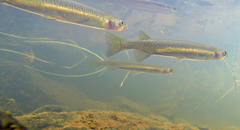A small slender, elongate olive-grey to amber Galaxias with irregular darker spots or blotches on the back and sides, a slightly forked tail, and the anal-fin origin directly below the dorsal-fin origin. The eyes, gill covers and belly are silvery-olive to white, and the fins are translucent. Adults migrate downstream and spawn in estuaries, laying their eggs amongst dense vegetation. On hatching, the larvae are washed out to sea and develop in the open ocean, returning as whitebait to the rivers and streams where they hatched.
You can help suppport me bringing this information to you via my Paypal
What habitats does Galaxias maculatus live in?
Occur in a wide variety of habitat, but mostly in still or slow-flowing waters, mainly in streams, rivers and lakes within a short distance of the sea
What is the distribution of Galaxias maculatus?
South-Eastern Australia including around Tasmania
How big does Galaxias maculatus grow?
Can grow to around 19cm
You can support me by dropping some funds into my Paypal account
This does not mean that it cannot be found locally, just that I have not been able to verify records at the time this species was added to the database.
Disclaimer: A lot of work goes into trying to identify and ensure accurate identifications are made and that the listed Descriptions, Sizes, Habitats and Distribution information is as accurate and valid as possible. Unfortunately, information in this arena is ever changing and as such no guarantee can be offered that it is correct or currently valid as a result the information is provided as a guide, and it is always suggested that you do a little research to ensure you have the latest and most accurate information. View the reference's or bibliography I welcome any feedback and comments on the information provided.
